Montana Documents
Quitclaim Deed
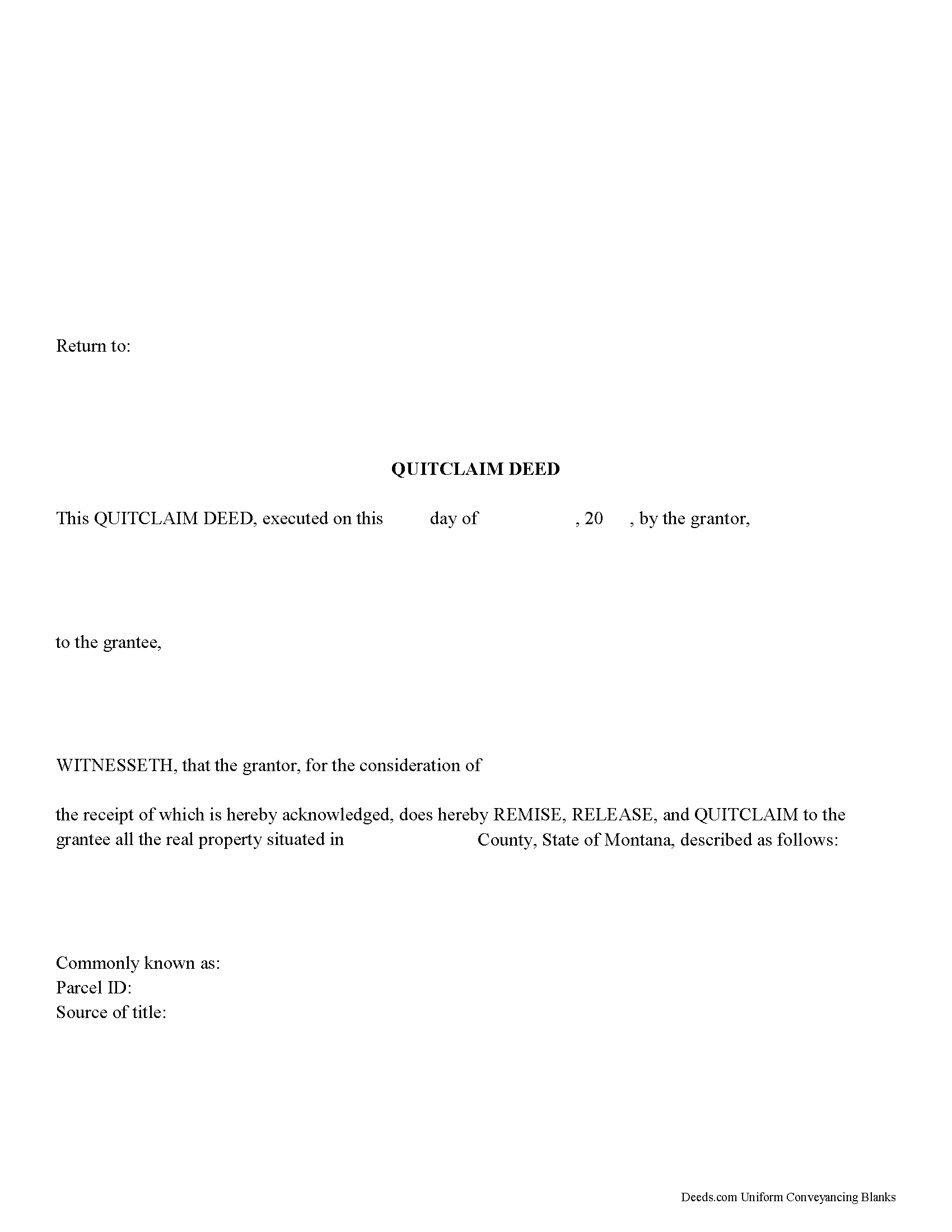
Real property transfers are governed by Title 70 of the Montana Code of Laws. Quitclaim deeds, while valid, are not specifically defined in the statutes.
Quitclaim deeds transfer any interest in real estate the grantor may have in real estate from the grantor (seller) to the grantee (buyer) without any warranty of title. When using a quitclaim deed, there may be potential unknown claims or restrictions on the title, and the buyer accepts the risk, effectively taking the title as-is.
These deeds are frequently used in instances such as a divorce, with one spouse signing all of his or her rights in a piece of real property over to the other spouse; when there is uncertainty about the history of the property's title, and it is necessary to clear extant claims on the title; or when a current owner or buyer wishes another party with interest in the property to disclaim that interest.
A lawful quitclaim deed includes the names and addresses of each grantor and grantee and a complete legal description of the property. Include the preparer's name, address, and signature as well (7-4-2618, 7-4-2636, MCA). Besides these requirements, the form must meet all state and local standard... More Information about the Montana Quitclaim Deed
Gift Deed
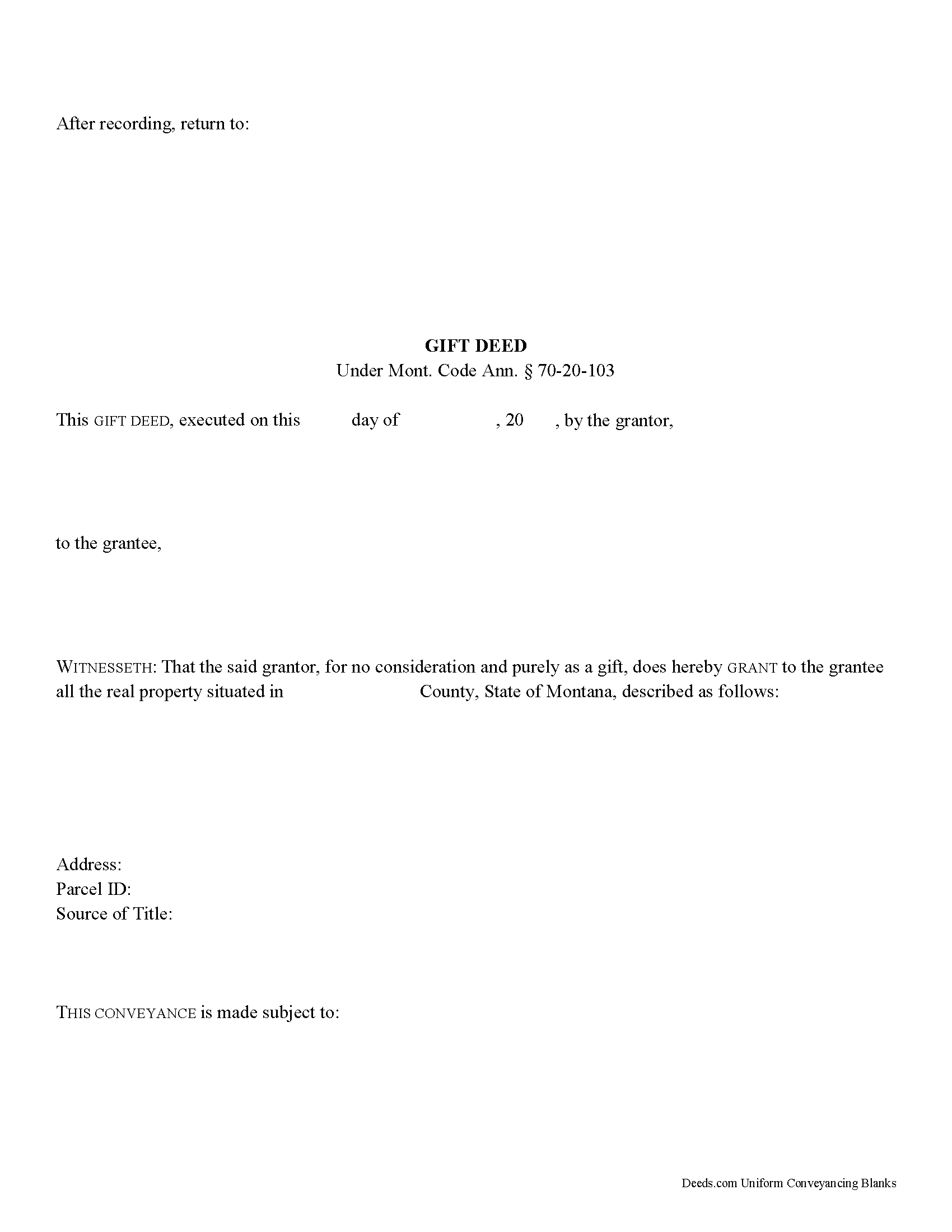
Gifts of Real Property in Montana
A gift deed, or deed of gift, is a legal document voluntarily transferring title to real property from one party (the grantor or donor) to another (the grantee or donee). A gift deed typically transfers real property between family or close friends. Gift deeds are also used to donate to a non-profit organization or charity. The deed serves as proof that the transfer is indeed a gift and without consideration (any conditions or form of compensation).
Valid deeds must meet the following requirements: The grantor must intend to make a present gift of the property, the grantor must deliver the property to the grantee, and the grantee must accept the gift. Gift deeds must contain language that explicitly states no consideration is expected or required, because any ambiguity or reference to consideration can make the deed contestable in court. A promise to transfer ownership in the future is not a gift, and any deed that does not immediately transfer the interest in the property, or meet any of the aforementioned requirements, can be revoked [1].
A lawful gift deed must also include the grantor's full name and marital status, as well as the g... More Information about the Montana Gift Deed
Warranty Deed
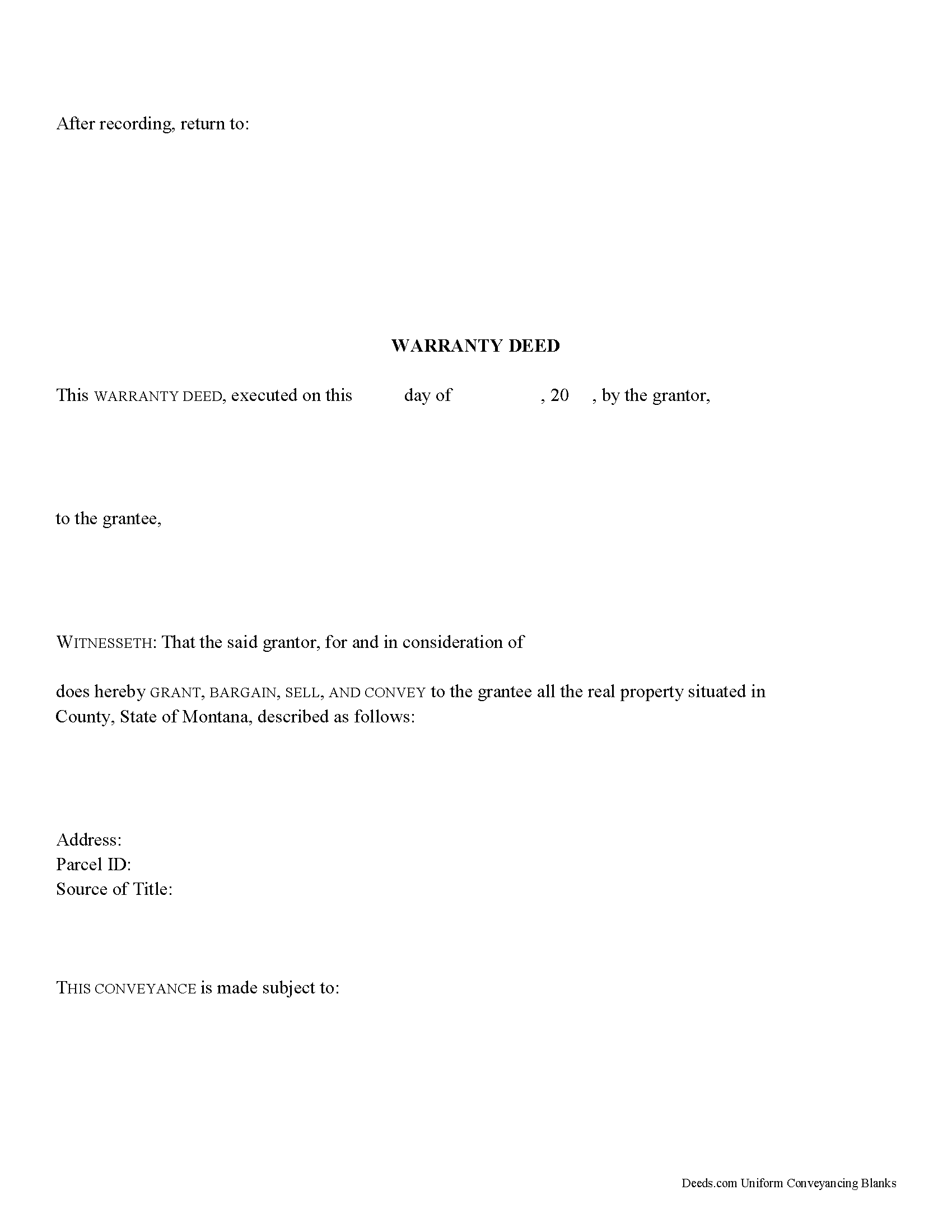
In Montana, real property can be transferred from one party to another by executing a warranty deed. These deeds are valid for both residential and commercial transactions.
Warranty deeds are not statutory in Montana. The state provides a general form that may be used for a warranty deed (Mont. Code Ann. 70-20-103). The warranties included in this type of deed are not defined by statute, except for covenants implied by the use of the word "grant." The word "grant" implies that, prior to the execution of the conveyance, the grantor did not convey the same estate or any right, title, or interest to any person other than the grantee. It also implies that, at the time of execution of the conveyance, the estate was free from encumbrances done, made, or suffered by the grantor or any person claiming under the grantor (Mont. Code Ann. 70-20-304). A standard warranty deed also covenants that the grantor will warrant and defend the title against the lawful claims of all person.
A lawful warranty deed includes the grantor's full name, mailing address, and marital status, and the grantee's full name, mailing address, marital status, and vesting. Vesting describes how the grantee holds t... More Information about the Montana Warranty Deed
Special Warranty Deed
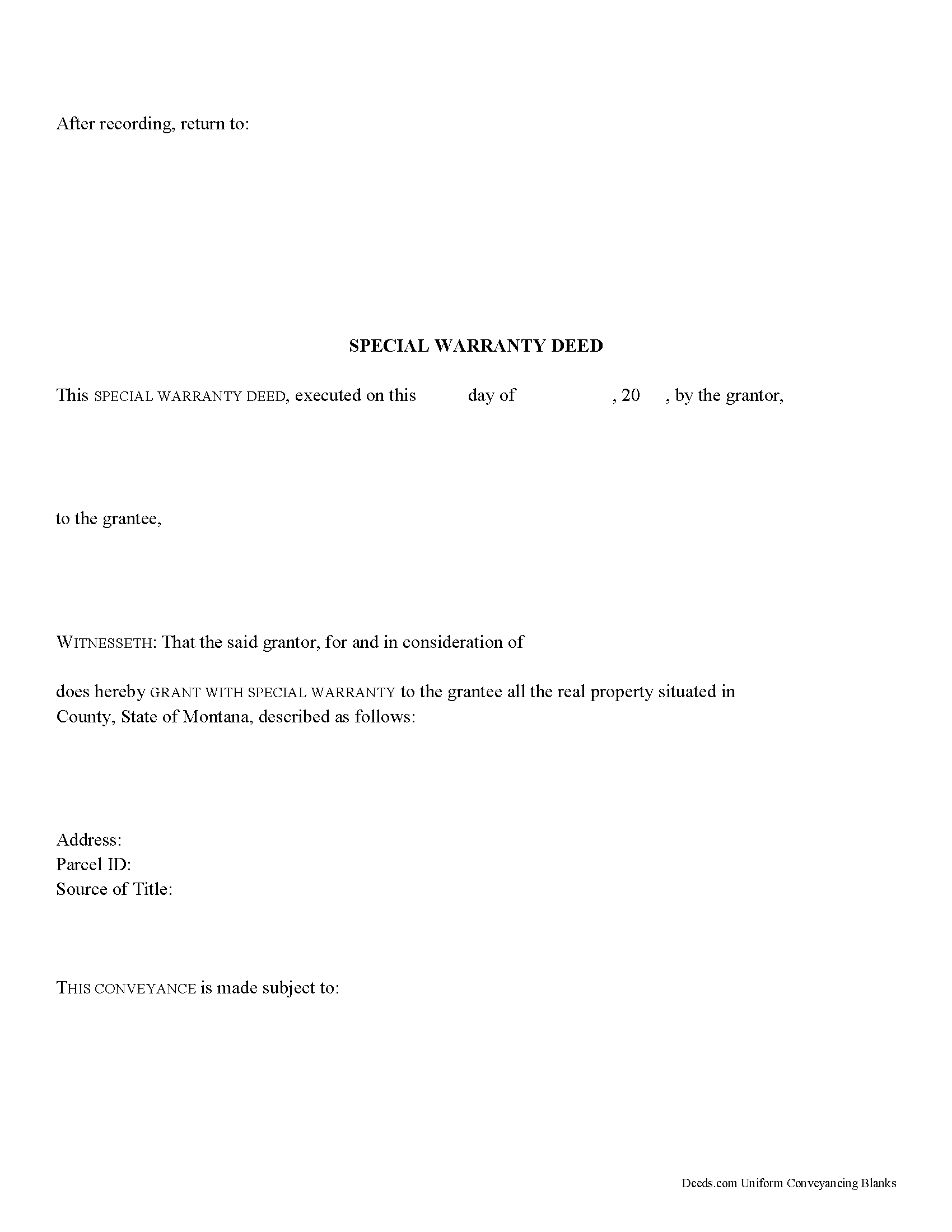
In Montana, real property can be transferred from one party to another by executing a special warranty deed. This type of deed is commonly used in commercial transactions, but is also valid for residential transfers.
Special warranty deeds are not statutory in Montana, but are still accepted forms of conveyance. The state provides a general form that may be used for a special warranty deed (Mont. Code Ann. 70-20-103). The warranties included in this type of deed are not defined by statute, except for covenants implied by the use of the word "grant." The word "grant" implies that, prior to the execution of the conveyance, the grantor did not convey the same estate or any right, title, or interest to any person other than the grantee. It also implies that, at the time of execution of the conveyance, the estate was free from encumbrances done, made, or suffered by the grantor or any person claiming under the grantor (Mont. Code Ann. 70-20-304).
A lawful special warranty deed includes the grantor's full name, mailing address, and marital status, and the grantee's full name, mailing address, marital status, and vesting. Vesting describes how the grantee holds title to the propert... More Information about the Montana Special Warranty Deed
Grant Deed
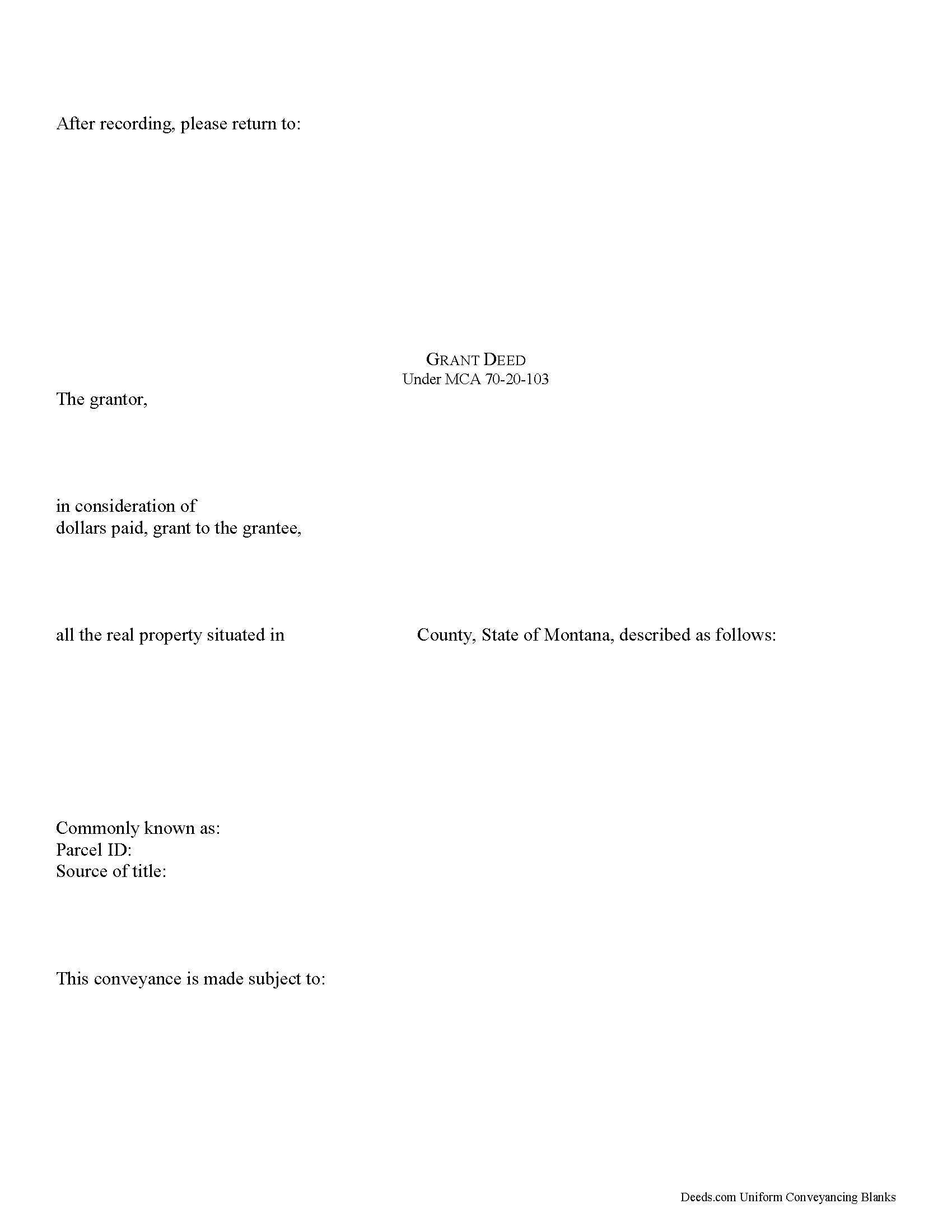
Real property can be transferred with an instrument in writing, which can be a grant, bill of sale, or a conveyance. A grant deed can be used in Montana to transfer title to real property. The Montana Code Annotated provides a general form for conveyances that can be used for a grant deed in this state (70-20-103). A grant deed includes covenants that the grantor has not conveyed the same property to any person other than the grantor and that the estate is free from any encumbrances done, made, or suffered by the grantor. A transfer of real property in Montana will pass all the easements attached to the property and will create in favor thereof an easement to use other real property of the person whose estate is transferred in the same manner and to the same extent as such property was obviously and permanently used by the person whose estate is transferred for the benefit thereof at the time the transfer was agreed upon or completed (70-20-308).
In order to have a grant deed recorded in Montana, it must be in writing, signed by the grantor or the grantor's lawful agent authorized in writing, and acknowledged or proved. The execution of the deed must be acknowledged as defined i... More Information about the Montana Grant Deed
Correction Deed
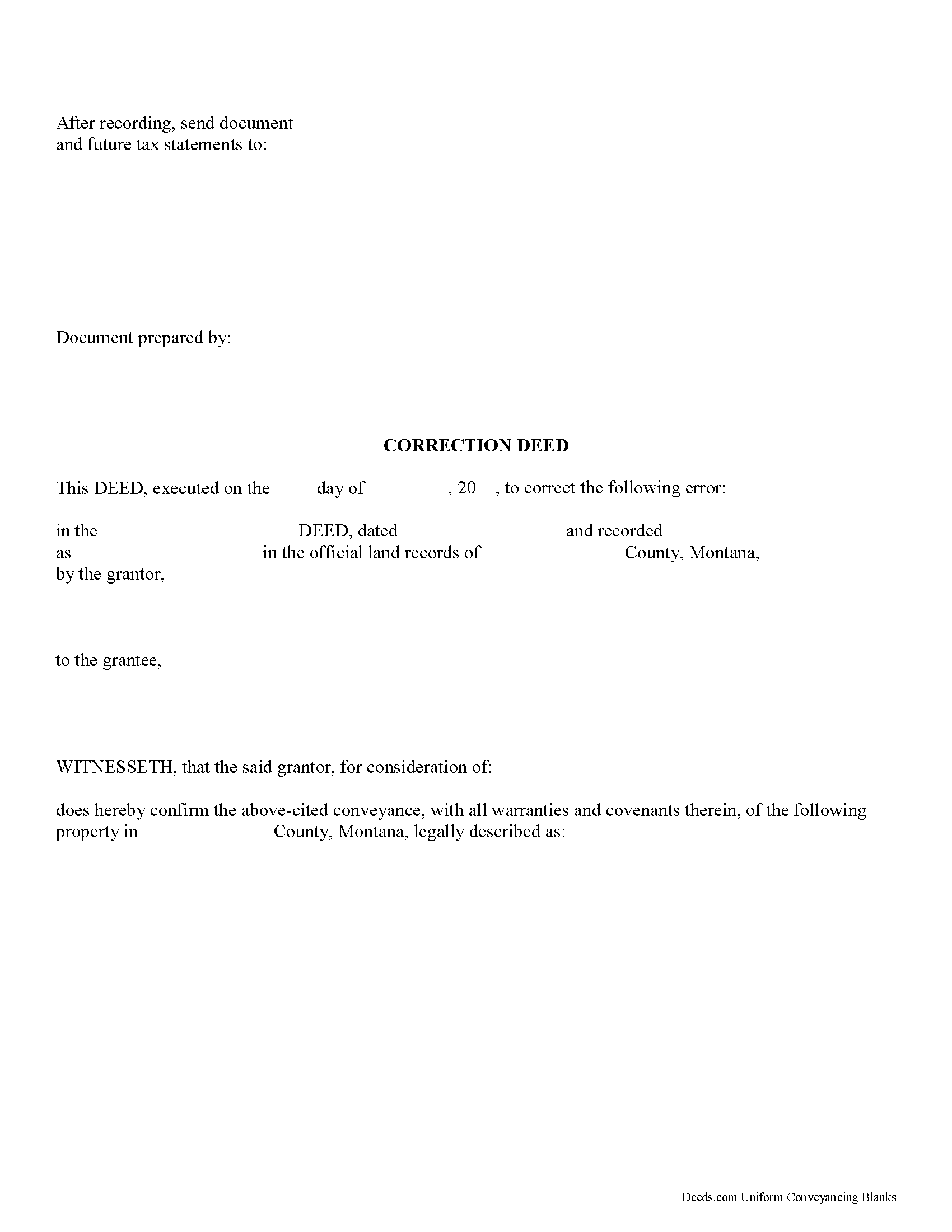
Use the correction deed to correct an error in a previously recorded deed of conveyance in Montana.
Correcting an error in a recorded deed helps prevent problems that might arise when the current owner tries to sell the property. The best method for correction is to prepare and record a new document, a so-called correction deed. This document does not convey title; instead, it confirms the prior conveyance of the property.
Apart from supplying the correct information, the new deed must state the reason for correcting, and it must reference the prior deed by title, date, and recording number. The original grantor must sign again, thus confirming the conveyance to the same grantee. Generally, corrective deeds are used to address minor errors in a deed, such as typos, accidentally omitted suffixes or middle initials in names, and other minor omissions. When in doubt about the gravity of an error, consult with a lawyer.
For certain changes, a correction deed may not be appropriate. Adding or removing a grantee, for example, or altering the manner in which title is held, or making material changes to the legal description, especially deleting a portion of the originally transf... More Information about the Montana Correction Deed
Deed of Trust and Promissory Note
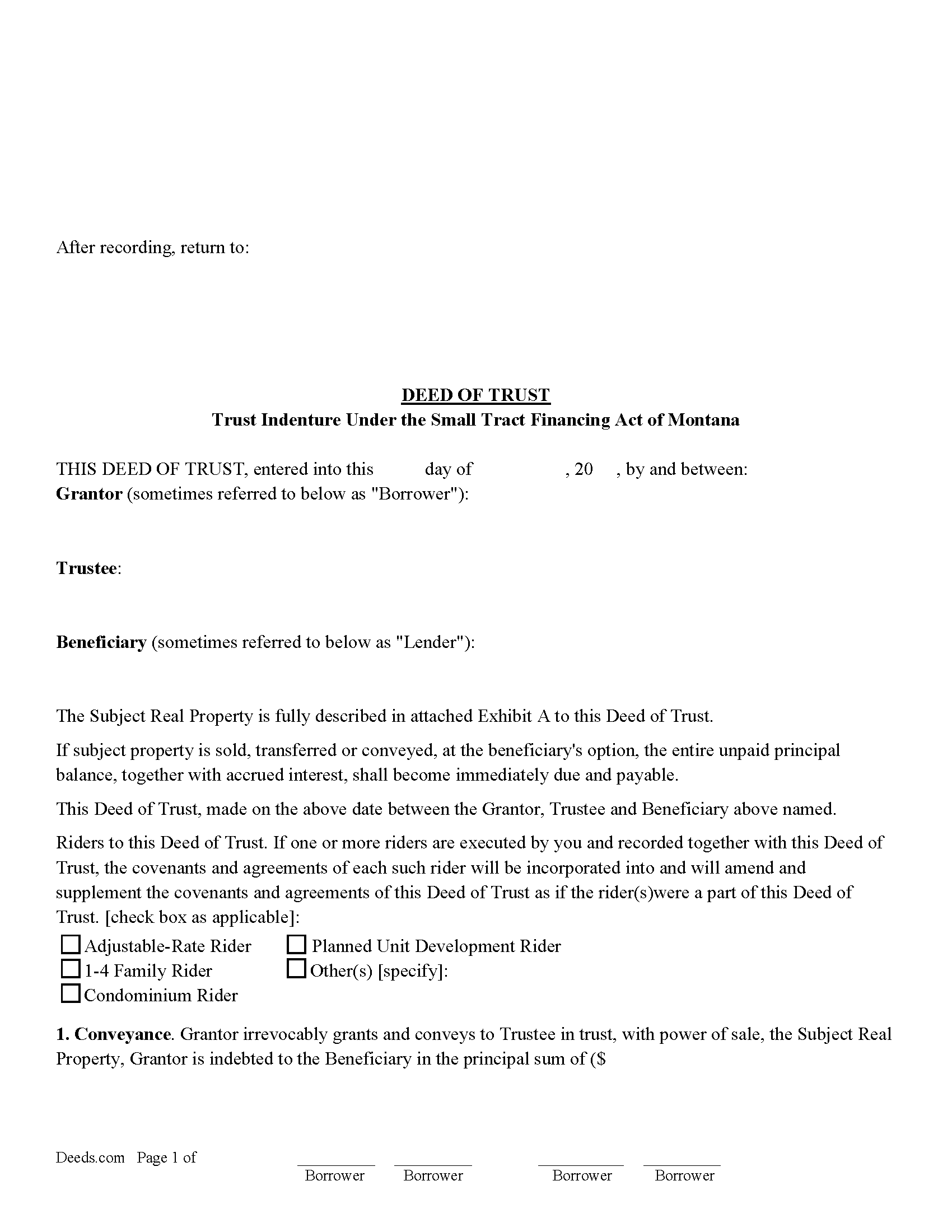
A Deed of Trust with Trust Indenture Under the Small Tract Financing Act of Montana is the preferred form of financing in Montana for properties not exceeding 40 acres and under $500,000.00 in financing.
71-1-302 Policy- Because the financing of homes and business expansion is essential to the development of the state of Montana and because financing of homes and business expansion, usually involving areas of real estate of not more than 40 acres, has been restricted by the laws relating to mortgages of real property and because more financing of homes and business expansion is available if the parties can use security instruments and procedures not subject to all the provisions of the mortgage laws, it is the public policy of the state of Montana to permit the use of trust indentures for estates in real property of not more than 40 acres as provided in this part.
This form includes the Power of Sale clause, which allows for a non-judicial foreclosure, saving time and expense, in general:
Non-judicial foreclosure takes (130-180 days) compared to @1 year -- judicial foreclosure
In a non-judicial foreclosure Borrower has no right of redemption vs. an additional year beyond a... More Information about the Montana Deed of Trust and Promissory Note
Substitution of Trustee-for Trust Indenture/Deed of Trust
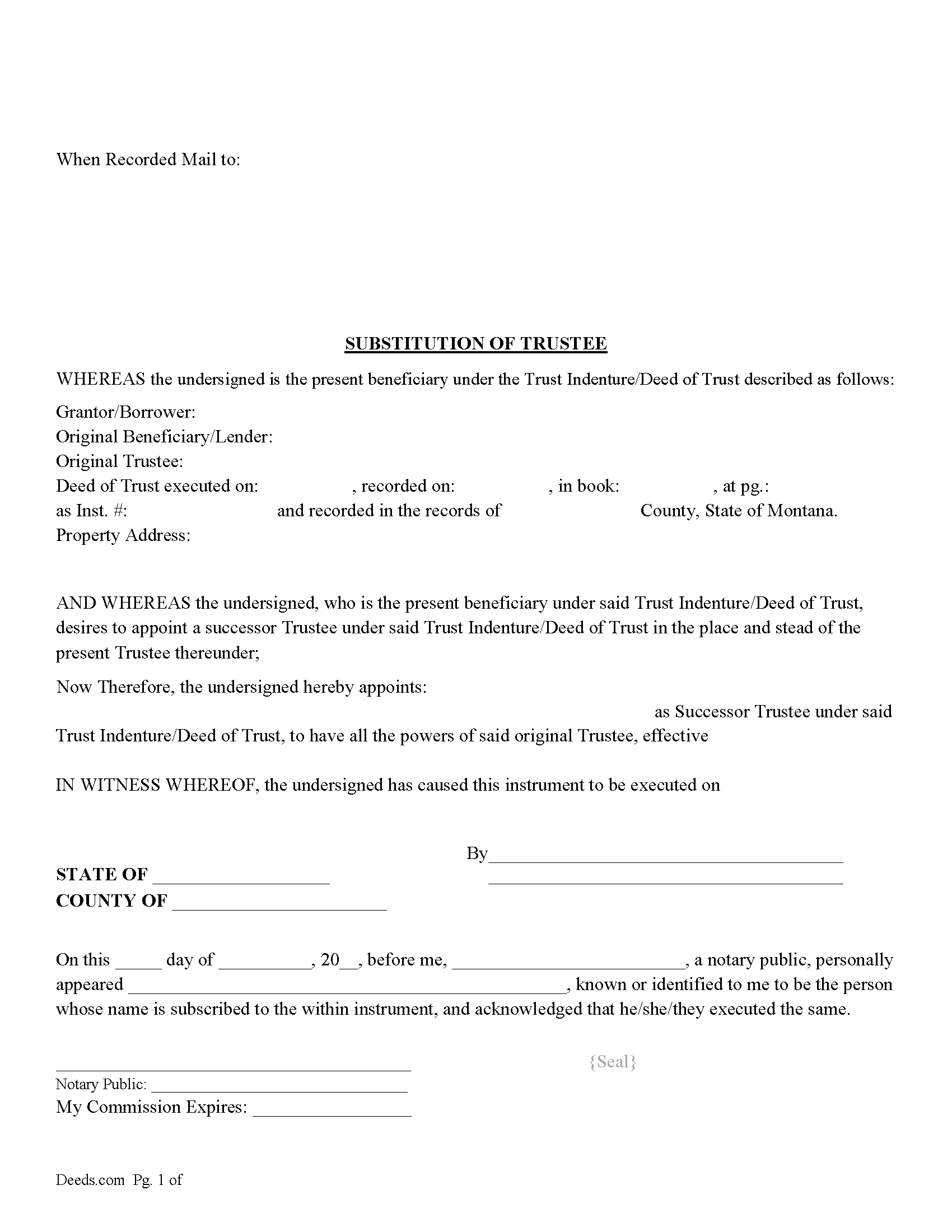
In this form the current beneficiary/lender appoints a new trustee/successor trustee in place of the current trustee for a Trust Indenture/Deed of Trust.
71-1-306. Qualifications of trustee -- successor trustee.
(1) The trustee of a trust indenture under this part must be:
(a) an attorney who is licensed to practice law in Montana;
(b) a bank, trust company, or savings and loan association authorized to do business in Montana under the laws of Montana or the United States; or
(c) a title insurer or title insurance producer or agency authorized to do business in Montana under the laws of Montana.
(2) The beneficiary may appoint a successor trustee at any time by filing for record, in the office of the clerk and recorder of each county in which the trust property or some part of the trust property is situated, a substitution of trustee. The substitution must identify the trust indenture by stating the names of the original parties to the trust indenture and the date of recordation and the book and page where the information is recorded, must state the name and mailing address of the new trustee, and must be executed and acknowledged by all of the beneficiaries des... More Information about the Montana Substitution of Trustee-for Trust Indenture/Deed of Trust
Deed of Full Reconveyance - for Trust Indenture/Deed of Trust
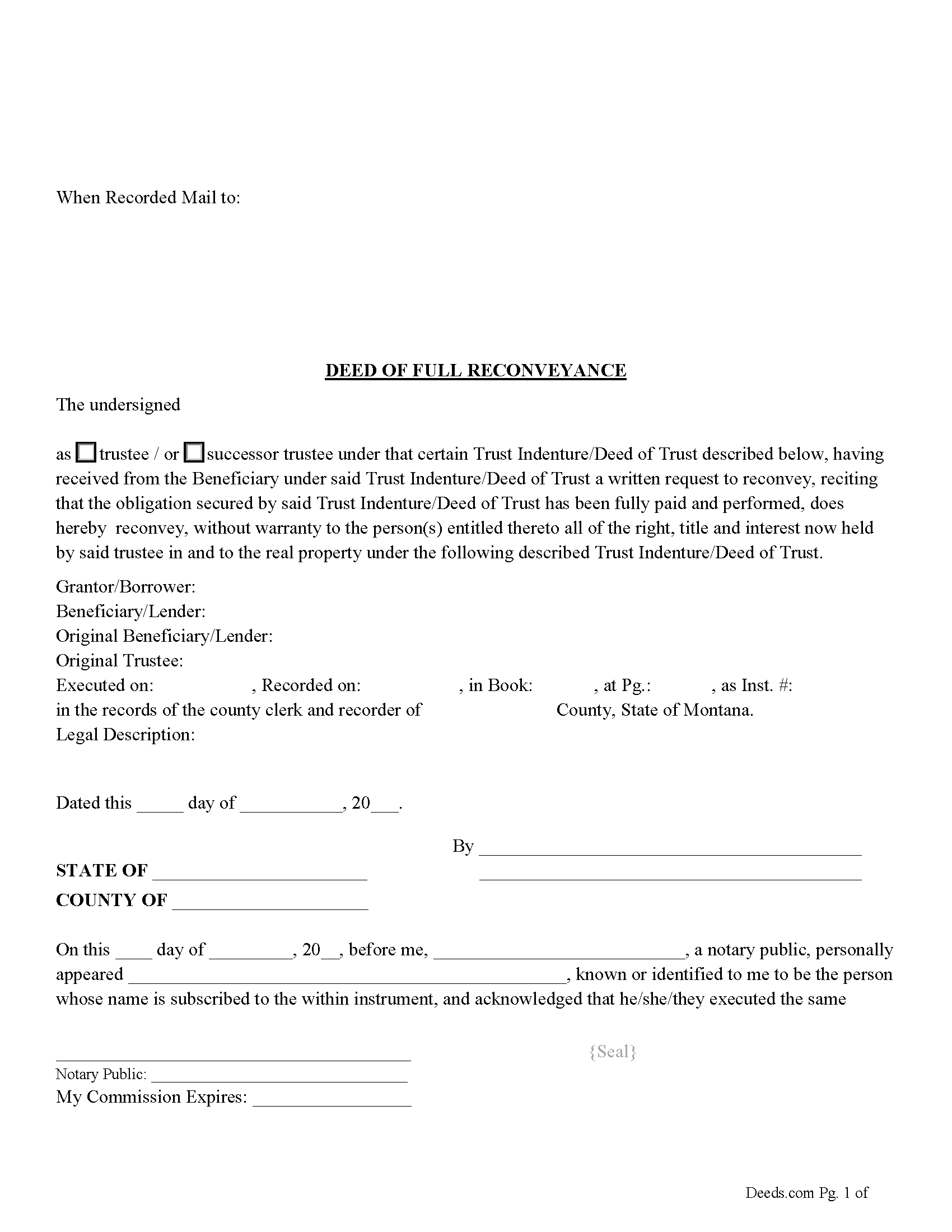
This form is used by the trustee or successor trustee to reconvey a trust indenture/deed of trust when it has been satisfied/paid in full.
71-1-307 Reconveyance upon performance -- liability for failure to reconvey
(1) Upon performance of the obligation secured by the trust indenture, the trustee, upon written request of the beneficiary or servicer, shall reconvey the interest in real property described in the trust indenture to the grantor. If the obligation is performed and the beneficiary or servicer refuses to request reconveyance or the trustee refuses to reconvey the property within 90 days of the request, the beneficiary, servicer, or trustee who refuses is liable to the grantor for the sum of $500 and all actual damages resulting from the refusal to reconvey.
(2) If a beneficiary or servicer has received a notice of intent to reconvey pursuant to 71-1-308 and has not timely requested a reconveyance or has not objected to the reconveyance within the 90-day period established in 71-1-308, the beneficiary or servicer is liable to the title insurer or title insurance producer for the sum of $500 and all damages resulting from the failur... More Information about the Montana Deed of Full Reconveyance - for Trust Indenture/Deed of Trust
Substitution of Trustee and Deed of Full Reconveyance - for Trust Indenture/Deed of Trust
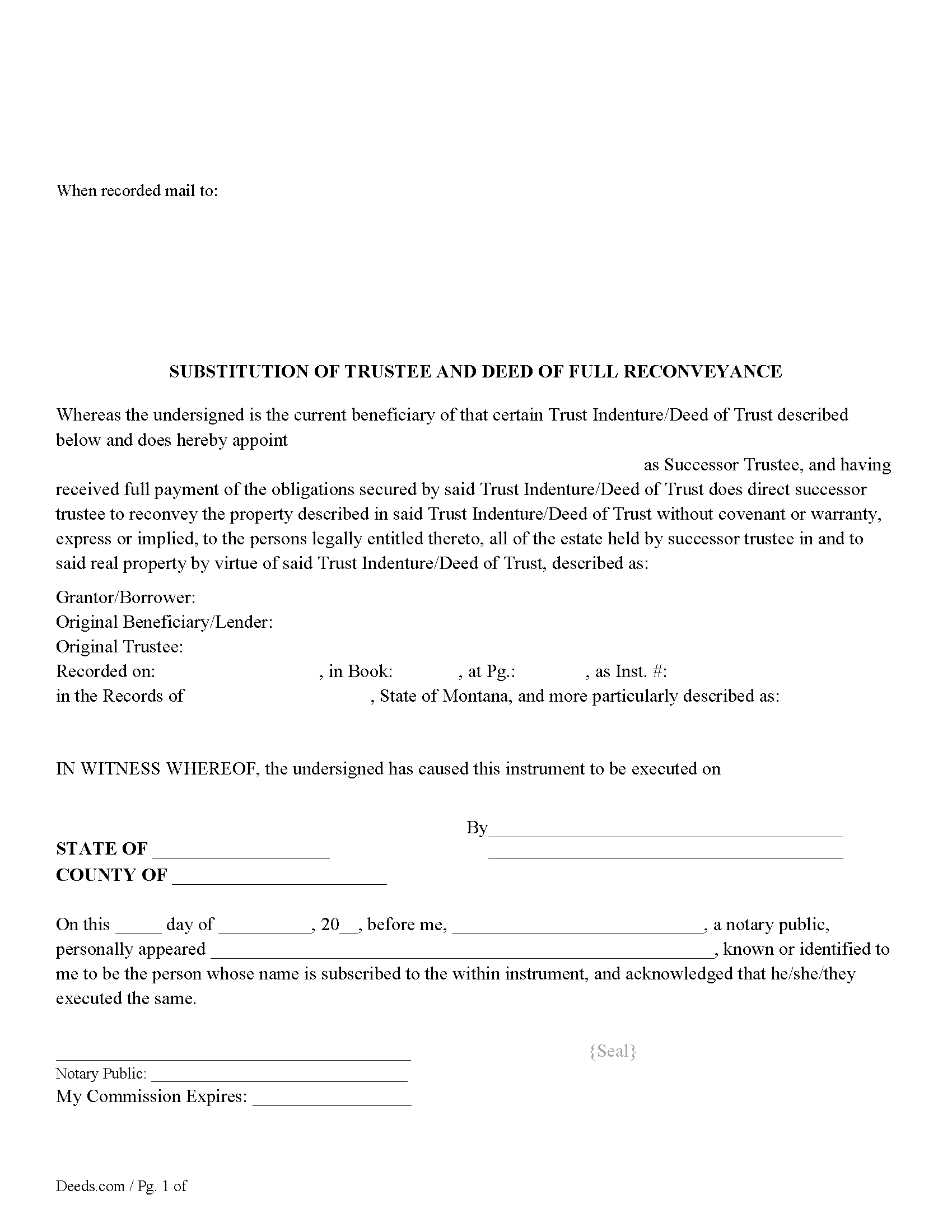
This form is initiated by the current beneficiary/lender, appoints a successor trustee who reconveys the Trust Indenture/Deed of Trust. This is typically performed when the loan/note has been paid in full/satisfied and the original trustee can't or won't reconvey the Trust Indenture/Deed of Trust in question.
71-1-306. Qualifications of trustee -- successor trustee.
(1) The trustee of a trust indenture under this part must be:
(a) an attorney who is licensed to practice law in Montana;
(b) a bank, trust company, or savings and loan association authorized to do business in Montana under the laws of Montana or the United States; or
(c) a title insurer or title insurance producer or agency authorized to do business in Montana under the laws of Montana.
(2) The beneficiary may appoint a successor trustee at any time by filing for record, in the office of the clerk and recorder of each county in which the trust property or some part of the trust property is situated, a substitution of trustee. The substitution must identify the trust indenture by stating the names of the original parties to the trust indenture and the date of recordation and the book and page where the inform... More Information about the Montana Substitution of Trustee and Deed of Full Reconveyance - for Trust Indenture/Deed of Trust
Assignment of Trust Indenture/Deed of Trust
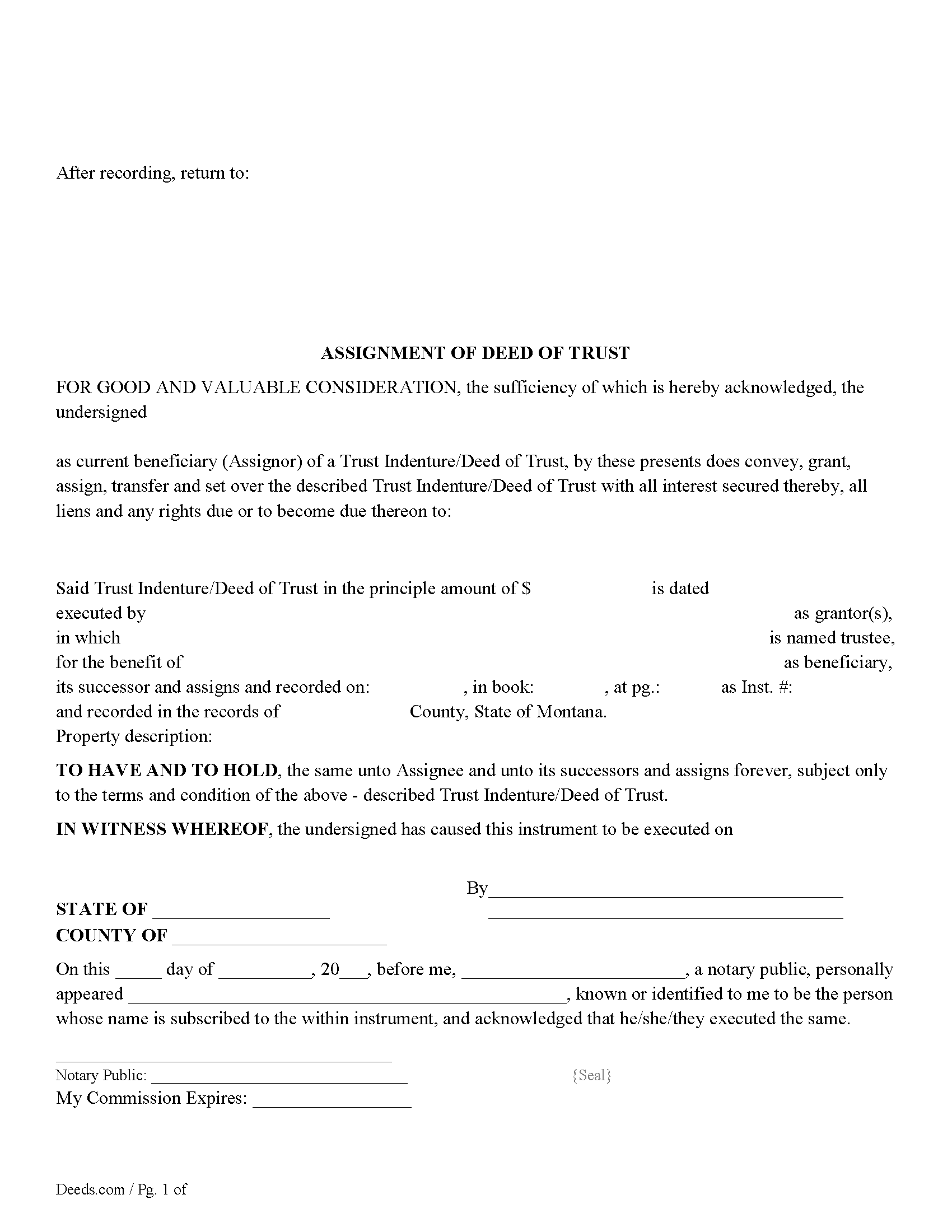
Use this form to assign a previously recorded Trust Indenture/Deed of Trust security instrument to another party. This is common when a Deed of Trust has been sold.
(Trust indenture - means an indenture executed in conformity with this part and conveying real property to a trustee in trust to secure the performance of an obligation of the grantor or other person named in the indenture to a beneficiary.) (71-1-303(6)) Definitions
71-1-207 Recording of mortgages and assignments
(1) Mortgages of real property may be acknowledged or proved, certified, and recorded in the same manner and with the same effect as grants of real property.
(2) An assignment of a real estate mortgage may be recorded in the same manner as a real estate mortgage, and the record operates as legal notice to the mortgagor and all persons subsequently deriving title to the mortgage from the assignor as well as to all other persons, including subsequent purchasers, encumbrancers, mortgagees, or other lienholders. An assignment must contain the assignee's post-office address at the assignee's place of residence... More Information about the Montana Assignment of Trust Indenture/Deed of Trust
Easement Deed
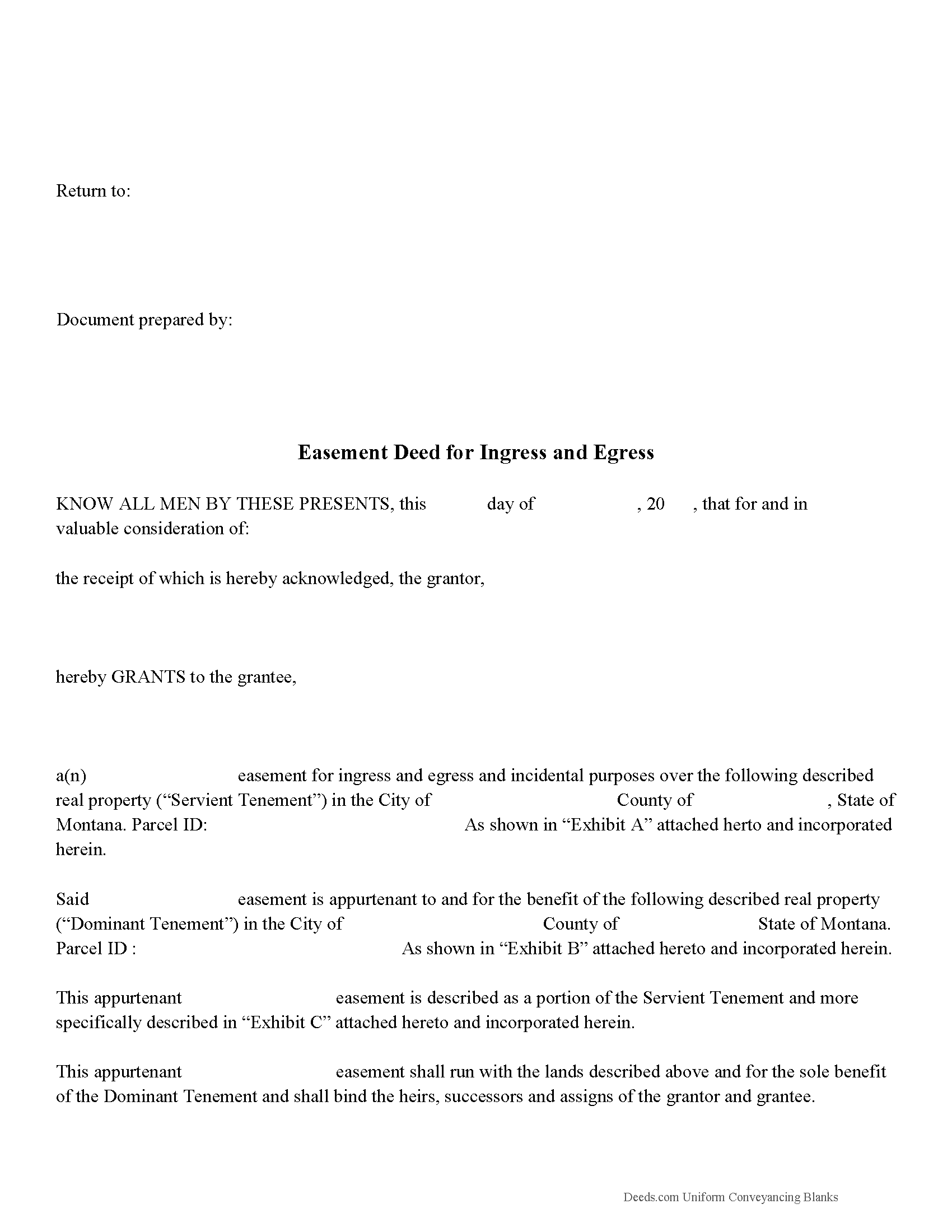
An easement is the right to use another person's property for a specific purpose. In Montana, any person who has a vested interest in a servient tenement can create a servitude (70-17-104). The land to which the easement is attached is the dominant estate, and the land upon which a burden or servitude (easement) is held is called the servient estate (70-17-103). The extent of the easement is determined by the terms of the grant or the nature of the enjoyment by which it was acquired (70-17-106). A transfer of real property in this state will pass all the easements attached to the property and will create in favor thereof an easement to use other real property of the person whose estate is transferred in the same manner and to the same extent as such property was obviously and permanently used by the person whose estate is transferred for the benefit thereof at the time the transfer was agreed upon or completed (70-20-308).
An easement that is obtained for the purpose of exposure of a solar energy device must be created in writing and is subject to the same conveyancing and recording requirements as other easements on real property (70-17-301). Wind easements are also created in... More Information about the Montana Easement Deed
Termination of Easement
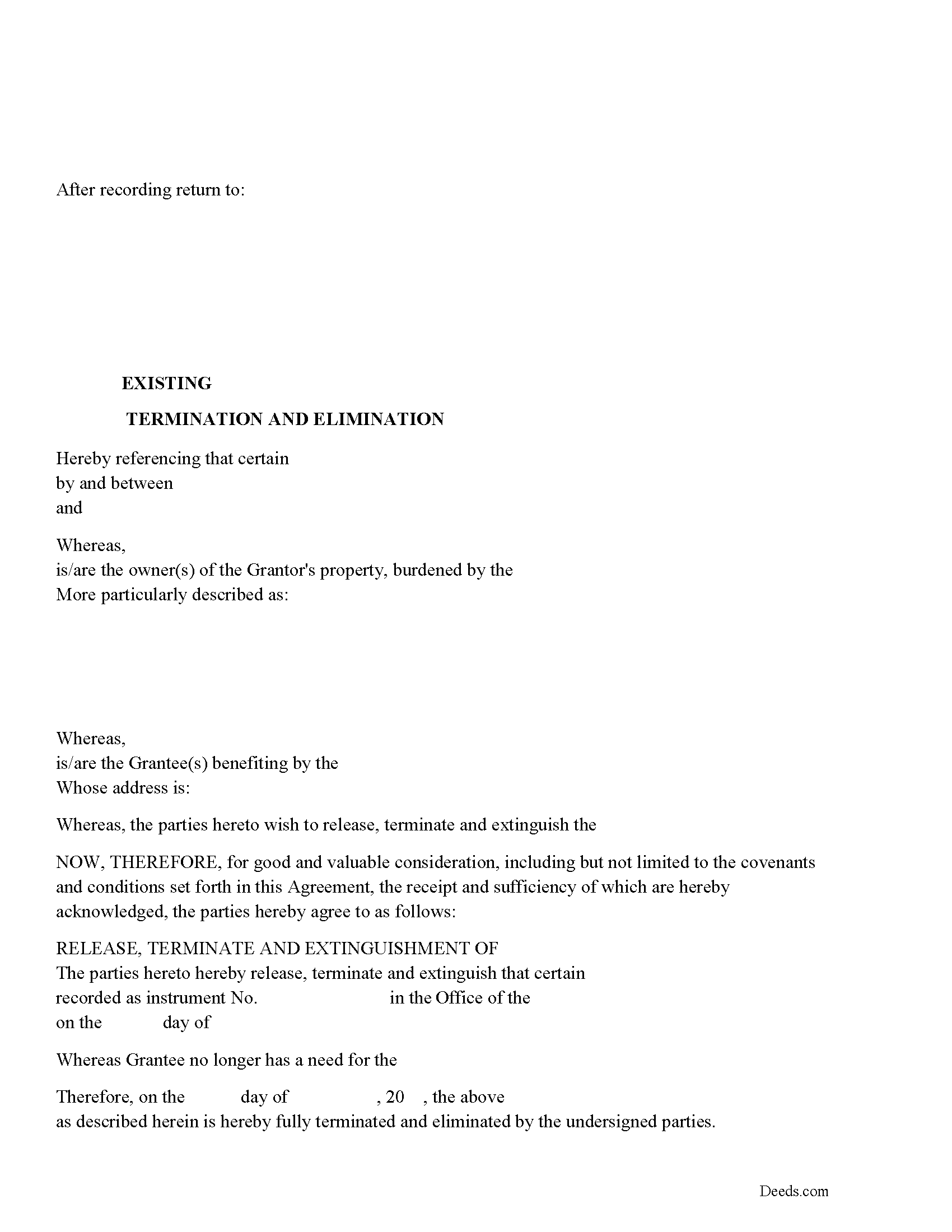
Use this form to release, terminate, extinguish a previously recorded document that involves access to and from a property.
Documents such as:
1. Easement Deeds or Agreements (An easement is a non-possessory interest in land, granting the right to use someone else's property for a specific purpose, like a driveway or utility line)
2. Access Roads
3. Right of Ways
4. Utility Easements (Power, Gas, Water, Sewer, Etc.)
5. Drainage Easements
This document allows the owner of the land, burdened by the access and the party that benefits from the access, to sign an agreement releasing the property from such access, ... More Information about the Montana Termination of Easement
Beneficiary Deed
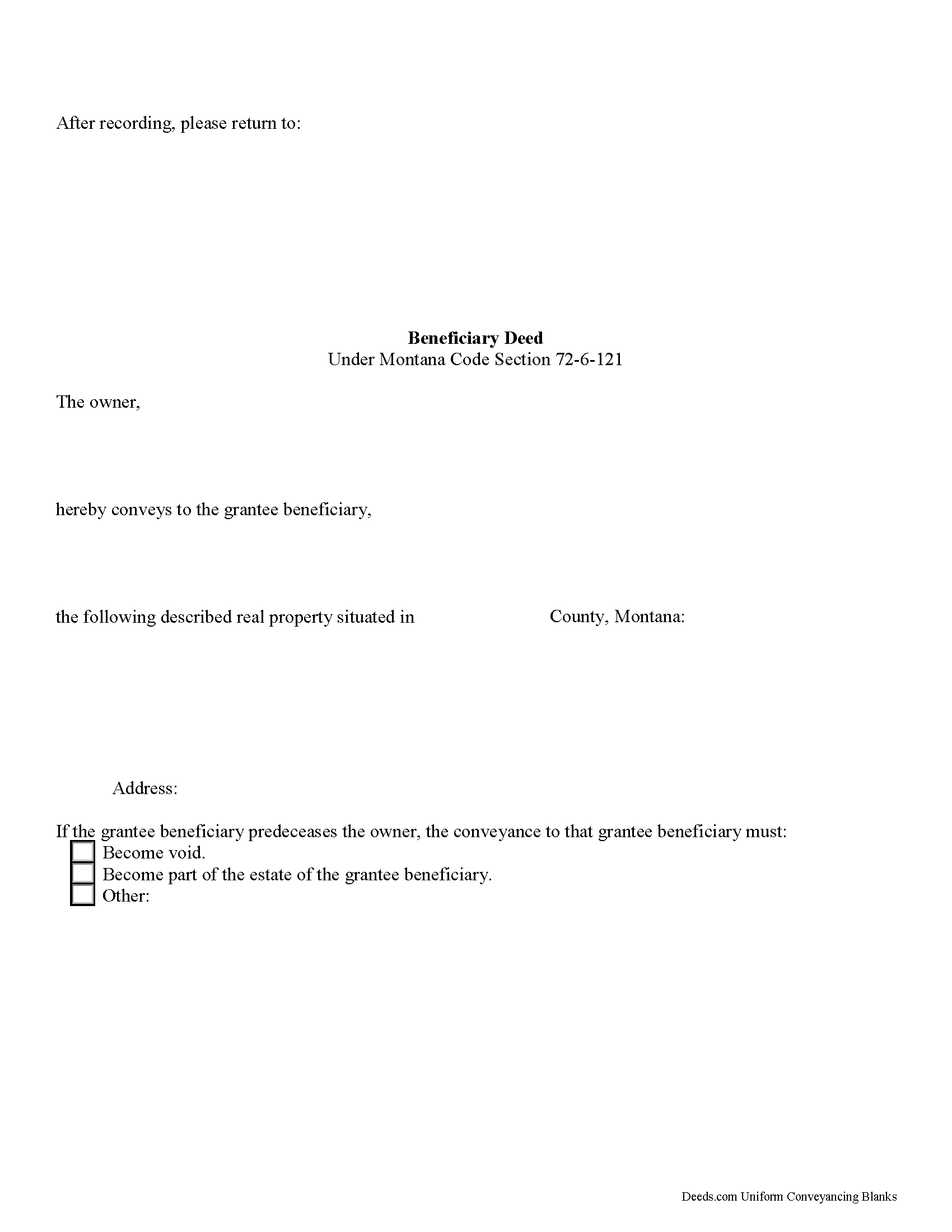
A beneficiary deed must be lawfully executed and recorded during the owner's life or it has no effect.
The Montana Legislature enacted the state's beneficiary deed law, found at Montana Code Annotated Section 72-6-121. All following parenthetical references identify the part of that section which contains additional information.
Beneficiary deeds are nontestamentary documents (11) that convey a potential future interest in real property, but they only become effective when the owner dies. Until that point, the owner retains absolute title to, control over, and use of the property, including the freedom to change or revoke the beneficiary designation, or to sell the property to someone else (6). If an owner executes and records more than one beneficiary deed concerning the same real property, the document recorded closest to the owner's death is the effective beneficiary deed (8).
Note that if the real estate is held as joint tenancy with the right of survivorship, all co-owners should sign the deed or the future transfer might be voided. Review the statute carefully and contact an attorney with questions before executing a beneficiary deed for jointly-held property (4).
... More Information about the Montana Beneficiary Deed
Beneficiary Deed Revocation
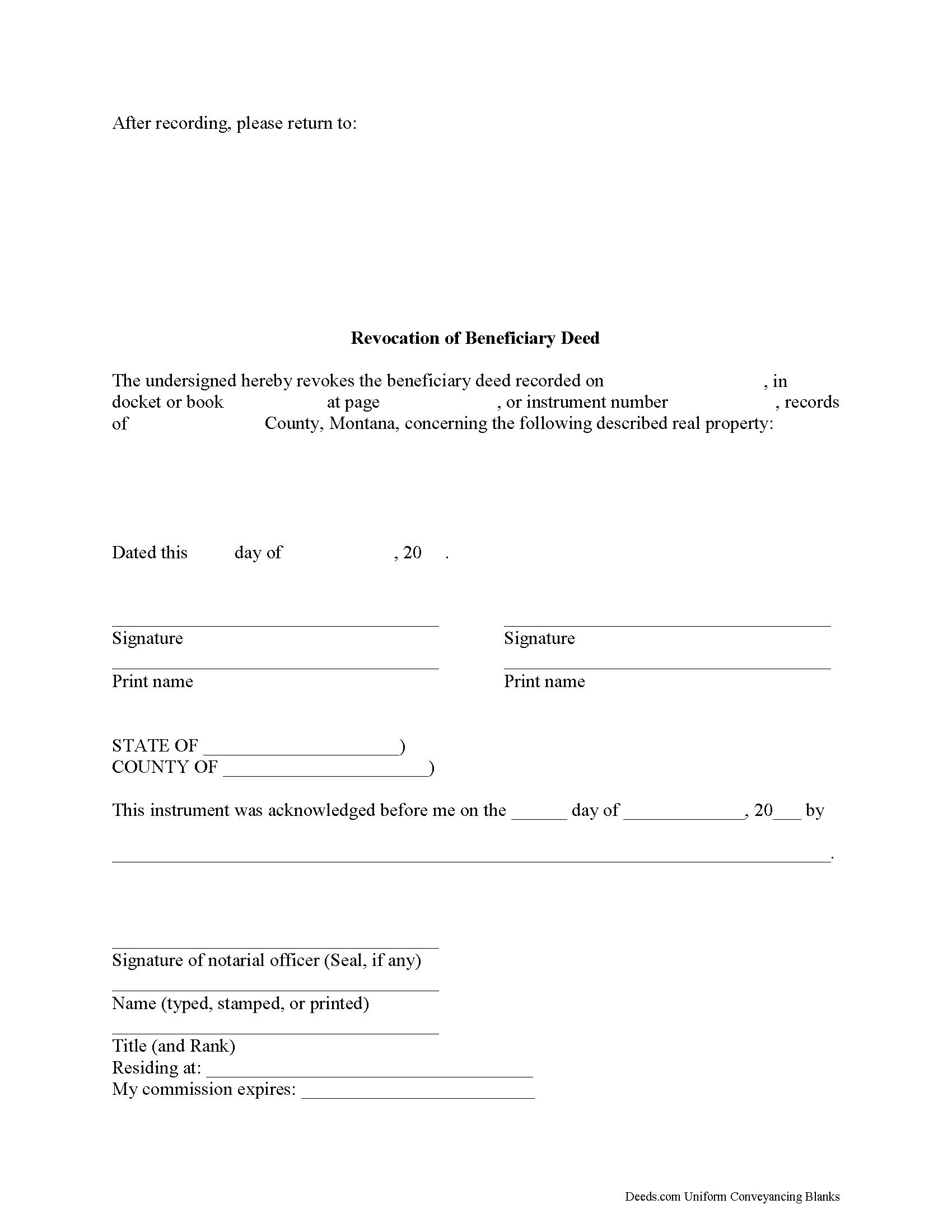
Revoking a Montana Beneficiary Deed
A revocation of a recorded beneficiary deed must be lawfully executed and recorded during the owner's life or it has no effect.
In 2007, the Montana Legislature enacted the state's beneficiary deed law, found at Montana Code Annotated Section 72-6-121. All following parenthetical references identify the part of that section which contains additional information.
Beneficiary deeds are nontestamentary documents that convey a potential future interest in real property, but they only become effective when the owner dies (11). Until that point, the owner retains absolute title to, control over, and use of the property, including the freedom to modify or revoke the beneficiary designation, or to sell the property to someone else. This flexibility is what makes beneficiary deeds so useful; it allows the owners to respond quickly if circumstances change. Note that if the real property is owned as joint tenants with right of survivorship and if the revocation is not executed by all the owners, the revocation is not effective unless executed by the last surviving owner (6).
If an owner executes and records more than one beneficiary deed concern... More Information about the Montana Beneficiary Deed Revocation
Beneficiary Deed Affidavit of Death
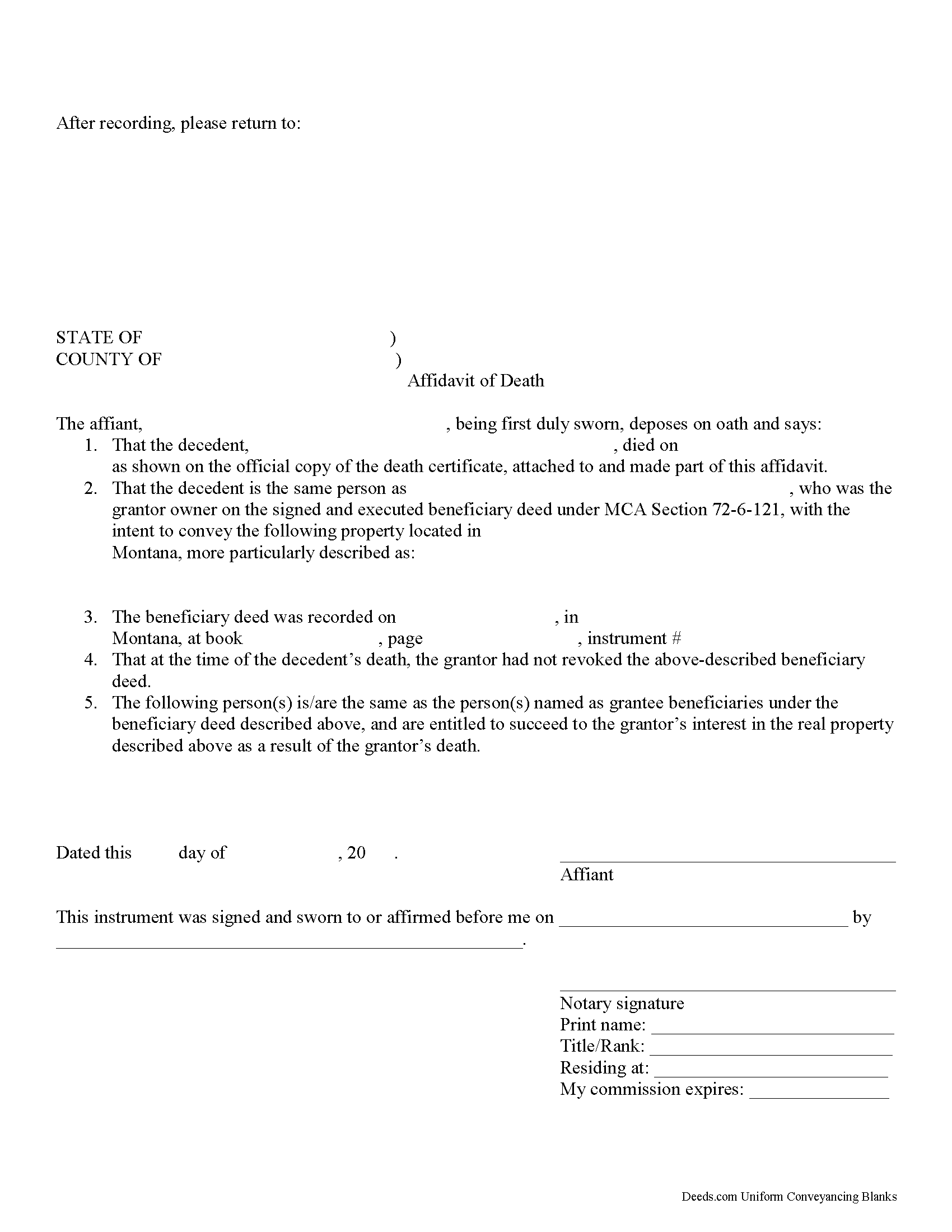
Transferring Title under a Montana Beneficiary Deed
In 2007, the Montana Legislature enacted the state's beneficiary deed law, found at Montana Code Annotated Section 72-6-121. All following parenthetical references identify the part of that section which contains additional information. The statute outlines the requirements for a beneficiary to gain ownership of real property from a beneficiary deed at 72-6-121(12).
The process involves completing and recording an affidavit of death. This document must contain the information specified in 7-4-2613(1)(c), including recording details from the beneficiary deed, a full legal description of the property interest, names and addresses of all surviving grantee beneficiaries, and evidence of the owner's death. In addition, attach an official copy of the deceased owner's death certificate. When the affidavit of death is completed and notarized, submit it to the clerk and recorder in each county in which the real property or any part of the real property is located.
Beneficiaries take ownership of the property subject to any mortgages, taxes, and obligations of record (1), including claims from the department of public health and ... More Information about the Montana Beneficiary Deed Affidavit of Death
Affidavit of Deceased Joint Tenant
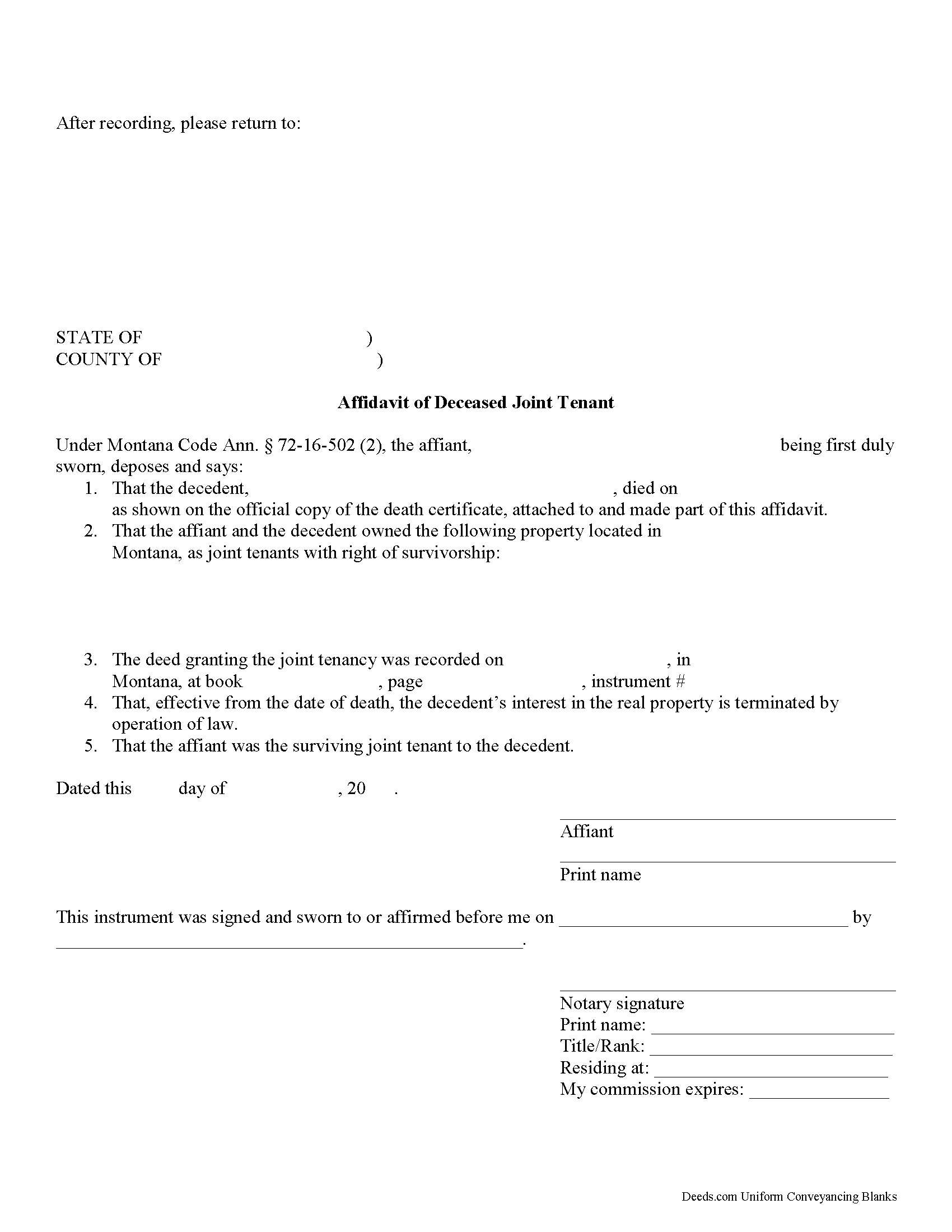
Montana's Affidavit of Deceased Joint Tenant
The Montana Affidavit of Deceased Joint Tenant form is appropriate for use by a surviving joint tenant, as identified on a recorded real property deed.
Montana Code Annotated defines how joint tenancy is created at Section 70-20-105 and the associated right of survivorship at 70-20-310.
Under 72-16-503, to formally initiate the process of perfecting the title, the surviving owner should complete and record an affidavit containing those matters required by 7-4-2613(1)(c). Among other details, this document should identify the parties, the property, and the recording information. Also include an official copy of the deceased owner's death certificate.
Submit the affidavit and any other necessary paperwork to the clerk and recorder for each county in which the real property or any part of the property is located.
This is an important step because it contributes to a clear chain of title (ownership history), which should, in turn, make future sales of the property less complex. It also serves as public notice of the change in the property's status.
Each case is unique, however, so contact an attorney for complex situatio... More Information about the Montana Affidavit of Deceased Joint Tenant
Mineral Deed
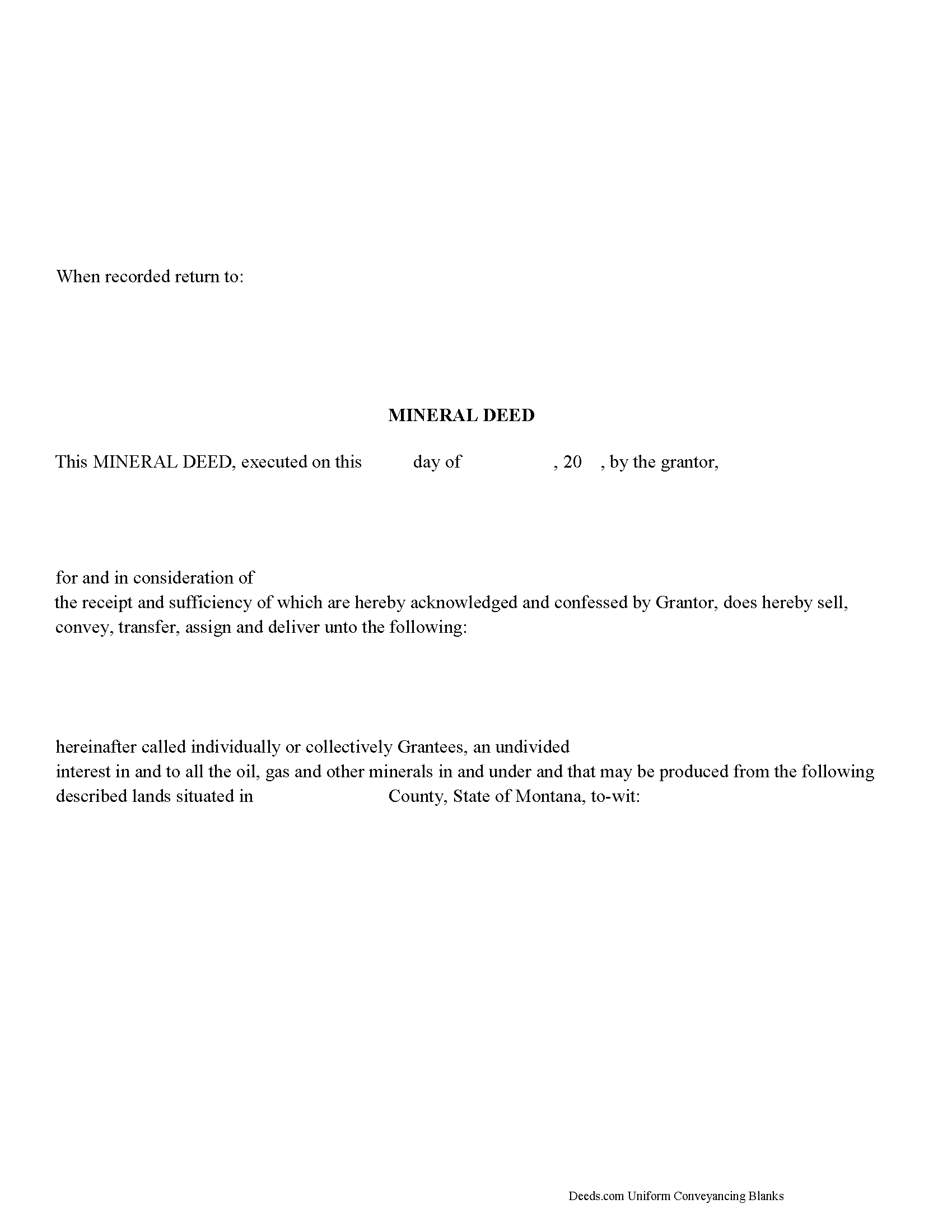
The General Mineral Deed in Montana transfers oil, gas, and mineral rights from the grantor to the grantee. THIS IS NOT A LEASE. There are no Exceptions or Reservations included.
The transfer includes the oil, gas and other minerals of every kind and nature. It also transfers any and all rights to receive royalties, overriding royalties, net profits interests or other payments out of or with respect to those oil, gas and other minerals. The Grantor can stipulate the percentage of Mineral Rights the Grantee will receive and is made subject to any rights existing under any valid and subsisting oil and gas lease or leases of record.
This general mineral deed gives the grantee the right to access, for the purpose of mining, drilling, exploring, operating and developing said lands for oil, gas, and other minerals, and storing handling, transporting and marketing of such.
In this document the Grantor Warrants and will defend said Title to Grantee. Use of this document has a permanent effect on your rights to the property, if you are not completely sure of what you are executing seek the advice of a legal professional.
(Montana MD Package includes form, guidelines, and complet... More Information about the Montana Mineral Deed
Mineral Deed with Quitclaim Covenants
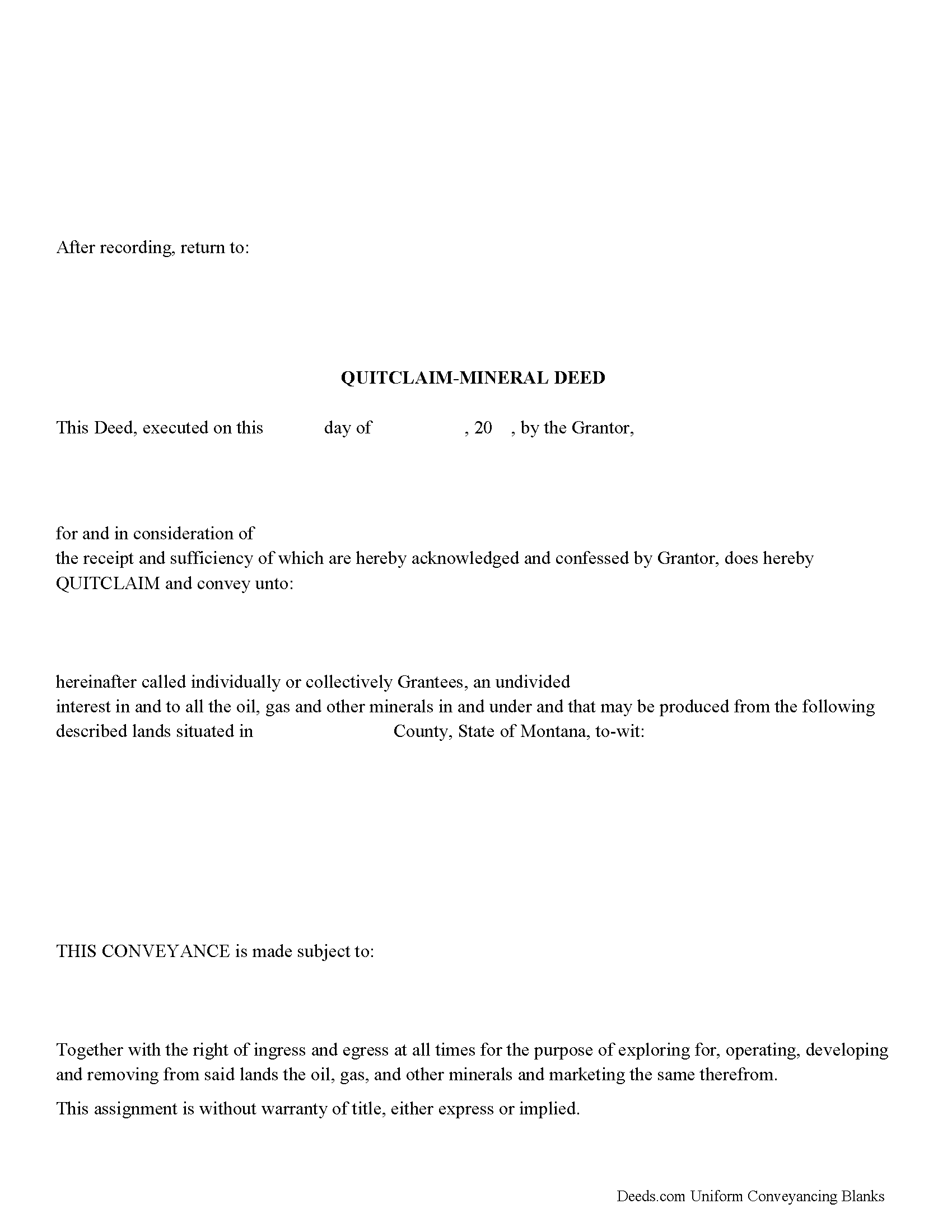
The General Mineral Deed in Montana Quitclaims oil, gas, and mineral rights from the grantor to the grantee. THIS IS NOT A LEASE. There are no Exceptions or Reservations included.
The transfer includes the oil, gas and other minerals of every kind and nature. The Grantor can stipulate the percentage of Mineral Rights the Grantee will receive.
This general mineral deed gives the grantee the right to access, for the purpose of mining, drilling, exploring, operating and developing said lands for oil, gas, and other minerals, and storing handling, transporting and marketing of such.
The seller, or grantor Quitclaims the mineral rights and does NOT accept responsibility to any discrepancy of title (This assignment is without warranty of title, either express or implied)
Uses: Mineral deeds with quitclaim are often used in situations where the grantor wants to quickly release any interest they might have in mineral rights, such as in settling estates, resolving disputes, clearing up uncertainties about ownership in a title's history or when mineral rights have previously been severed or fragmented from surface rights and cloud a title, making it difficult to transfer property... More Information about the Montana Mineral Deed with Quitclaim Covenants
Personal Representative Deed
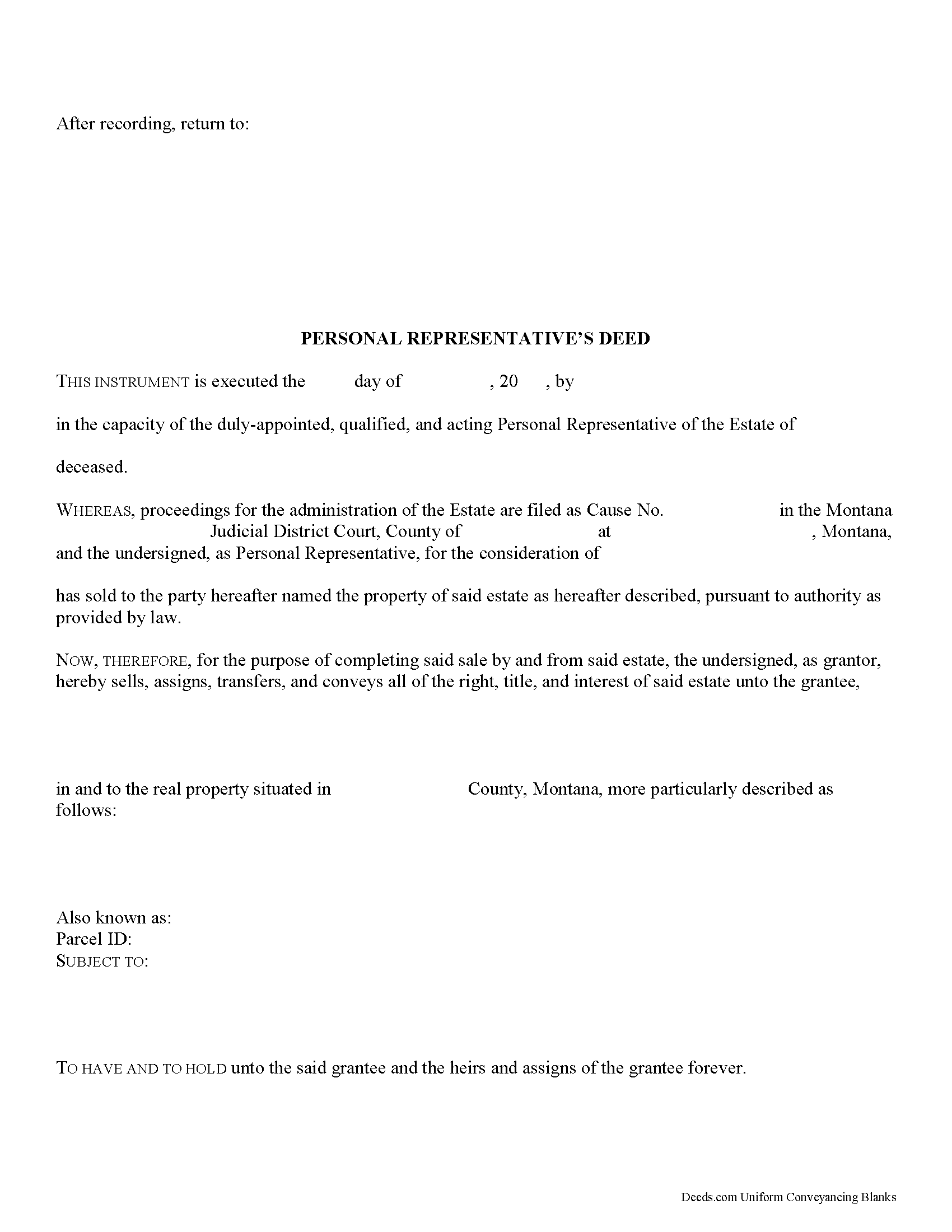
The Montana Uniform Probate Code (UPC), codified under Title 72 of the Montana Code, governs probate in that state.
A personal representative's deed is a fiduciary instrument used to convey real property from an estate to a purchaser. A personal representative (PR), who may also be referred to as an executor or an administrator, is the person appointed to manage the decedent's estate.
PR deeds must meet all state and local standards, and may require supporting information, depending on the situation. Record the completed deed of distribution in the county clerk/recorder's office of the county wherein the subject property is located to transfer title.
Execute a PR deed pursuant to a court order for sale when partition among multiple distributees cannot be conveniently made; to facilitate payment of the estate's debts; or as directed by the decedent's will. The personal representative need not seek approval to complete any transaction authorized by the UPC under 72-3-613, including sales of real property, unless the estate is subject to formal probate.
As always, consult an attorney licensed in the State of Montana with questions regarding Montana personal representative... More Information about the Montana Personal Representative Deed
Personal Representative Deed of Distribution
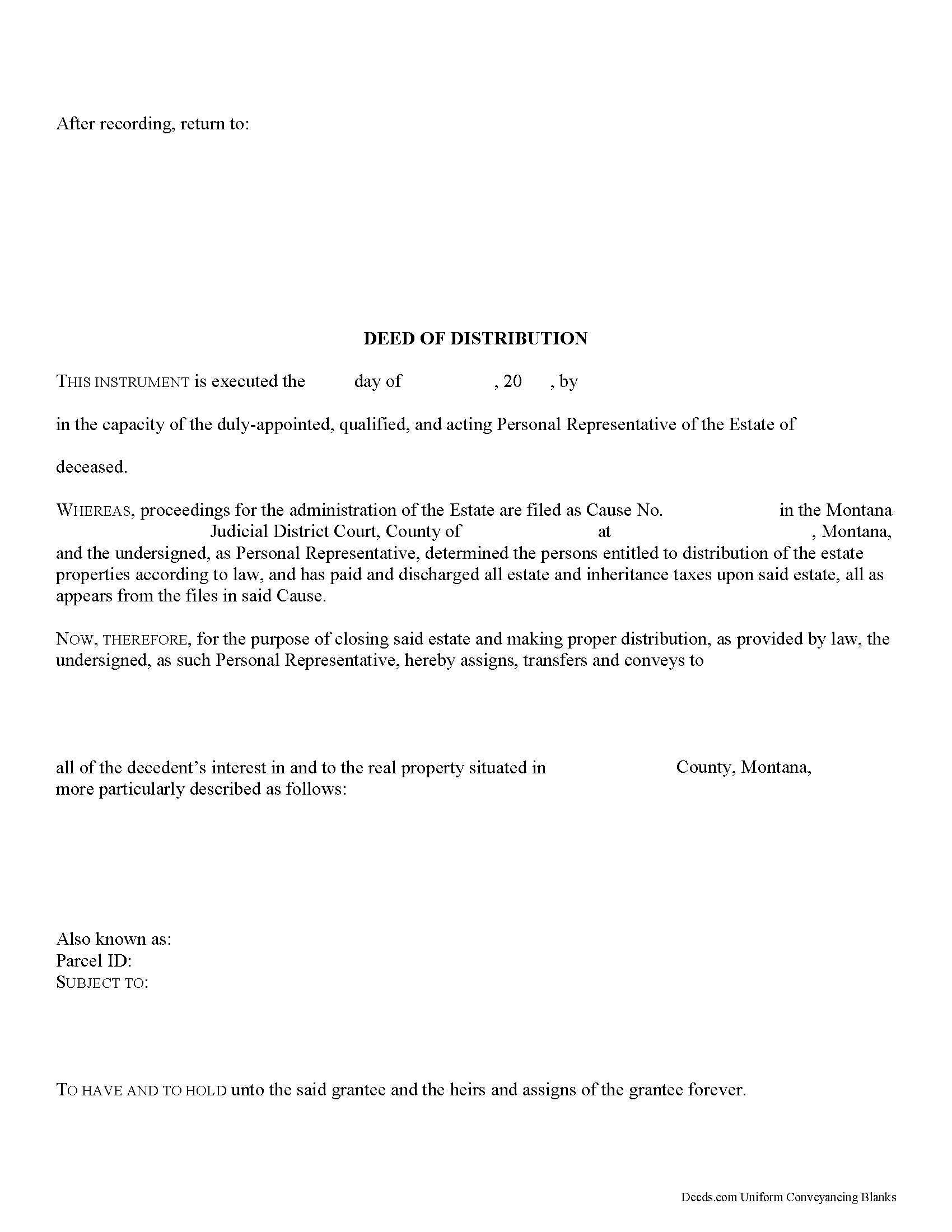
The Montana Uniform Probate Code (UPC), codified under Title 72 of the Montana Code, governs probate in that state.
A personal representative (PR), who may also be referred to as either an executor or administrator, is the fiduciary appointed to manage the decedent's estate. The personal representative's deed of distribution is an instrument used in probate proceedings as evidence that a distributee has succeeded to the decedent's interest in real property ( 72-3-904, MCA).
PR deeds must meet all state and local standards, and may need supporting information, depending on the situation. Record the completed deed in the county clerk/recorder's office of the county wherein the subject property is located to transfer title to distributees. This transaction requires a Realty Transfer Certificate, but no sales information as per 15-7-307(9), MCA.
As always, consult an attorney licensed in the State of Montana with questions regarding Montana personal representative's deeds of distribution, or any other issue related to probate.
(Montana PRD of Distribution Package includes form, guidelines, and completed example)... More Information about the Montana Personal Representative Deed of Distribution
Trustee Deed
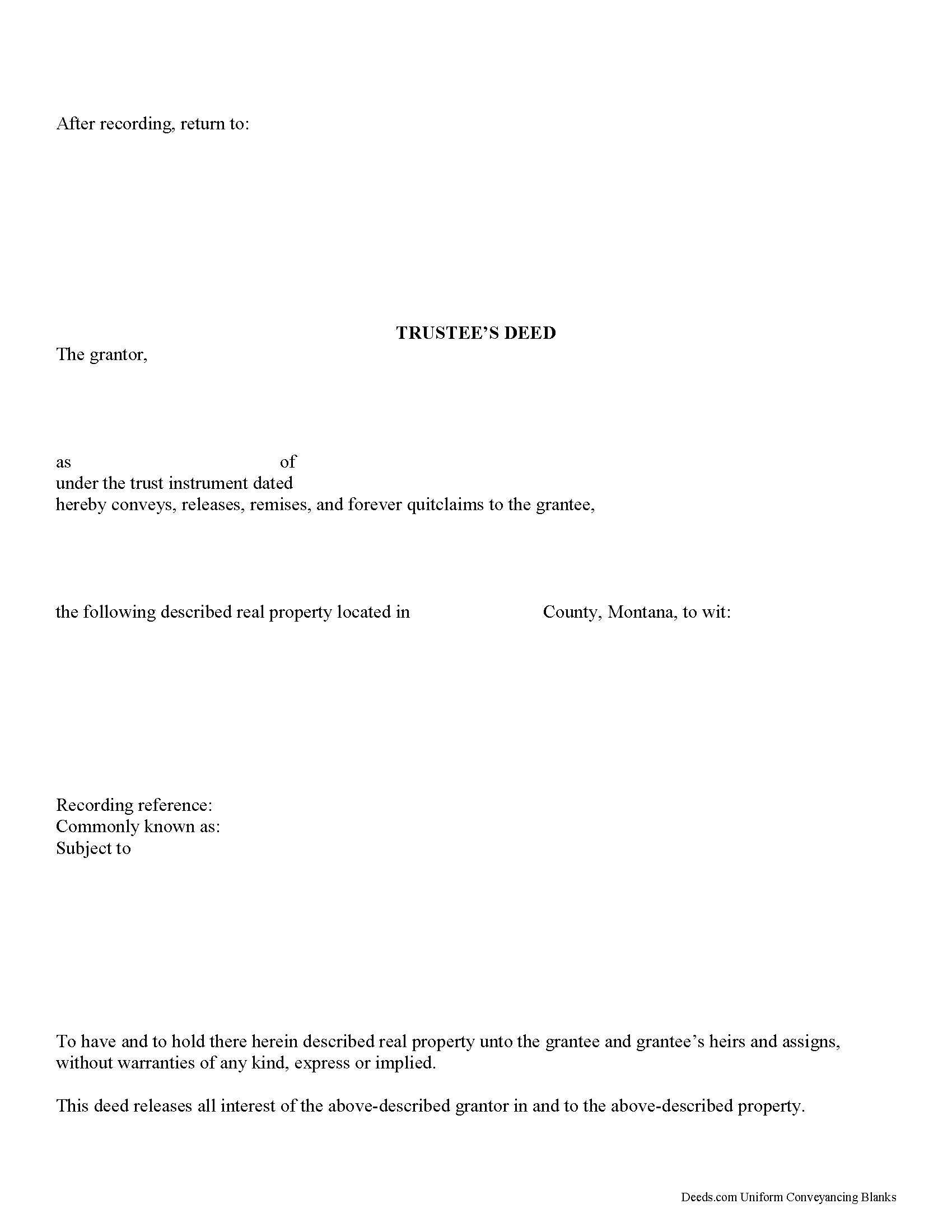
Transferring Real Property from a Living Trust in Montana? Use a Trustee's Deed
In Montana, a trustee uses a trustee's deed to convey property held in a living trust. This trustee's deed is different from a trustee's deed to the purchaser at the trustee's sale.
A living trust is an estate planning tool that allows the trust maker to determine what happens to their assets upon death.
The living trust relationship involves three parties: the settlor (trust maker), who establishes the trust and funds it with assets (including real property); the trustee, who holds title to the property on behalf of the trust; and the beneficiary, who has a present or future interest in the property held in trust. The settlor is able to revoke a living trust up until his death, at which point the trust becomes irrevocable.
The trust is established by a trust instrument executed by the settlor. The instrument names the trustee -- whether an individual, multiple people, or a corporate trustee --, the beneficiaries, and the trust's terms or provisions. Because the trust cannot technically hold title, property transferred into it is titled in the name of the trustee on behalf of the trust.
... More Information about the Montana Trustee Deed
Certificate of Trust
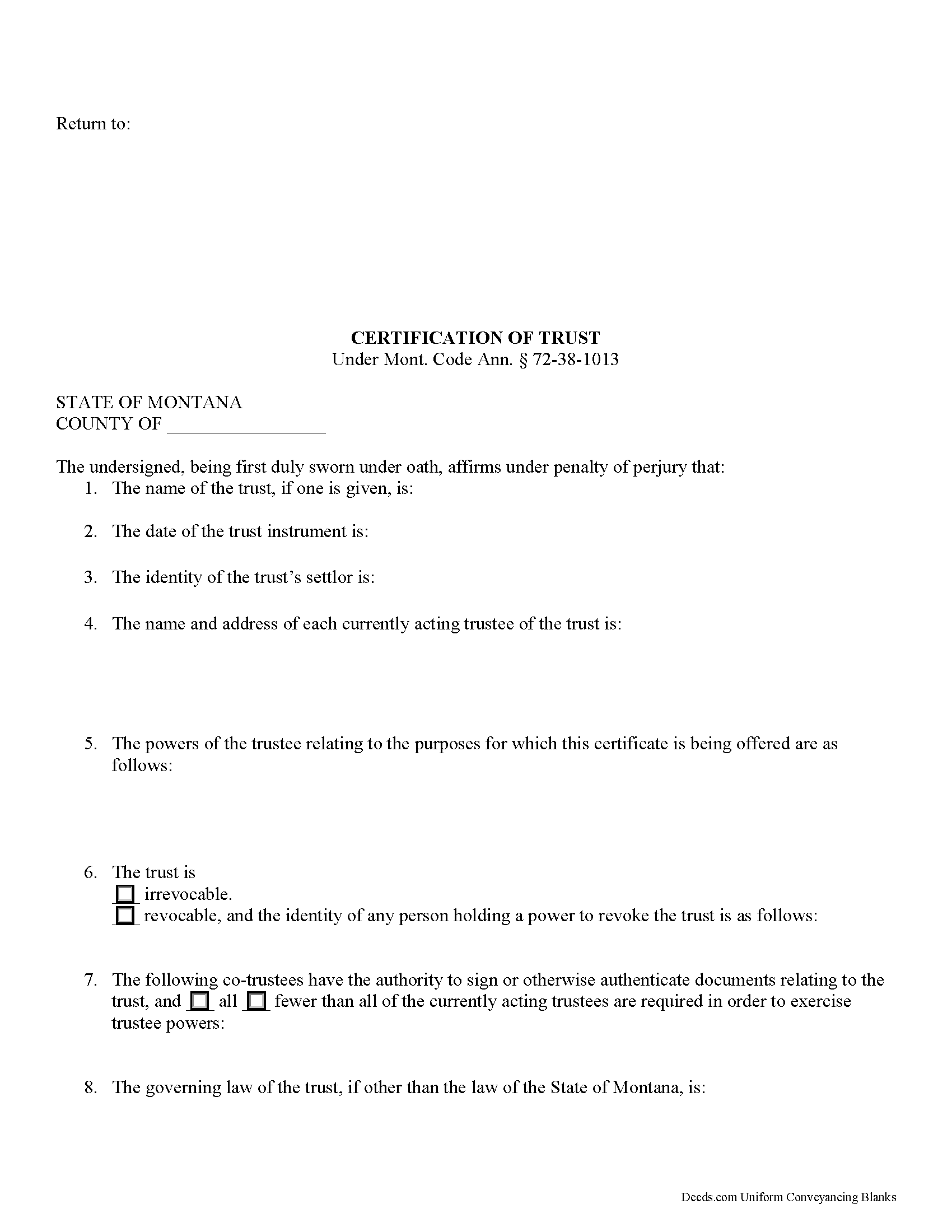
The certification of trust in Montana is an affidavit containing sworn statements made by the trustee or trustees of a trust.
In a trust arrangement, a settlor entrusts property to a trustee for the benefit of a beneficiary. The trustee is the administrator of the trust's assets.
Instead of furnishing the trust instrument (an unrecorded document containing the trust's provisions, including the designation of the trust's beneficiary) the certificate is an abstract supplying only the relevant information required of the trustee in order to prove his authority to enter into a transaction on the trust's behalf.
Codified under the Montana Uniform Trust Code at 72-38-1013, the certification of trust contains basic information, such as the trust's name, date, settlor, and each trustee's name and address. The certificate verifies that the trust exists and that the trustee is authorized to act by providing a description of the trustee's powers relating to the pending action.
For example, a trustee may furnish a certificate when conveying real property held in a living trust. When used in real property transactions, a recorded certificate fulfills the requirements under Mont... More Information about the Montana Certificate of Trust
Disclaimer of Interest
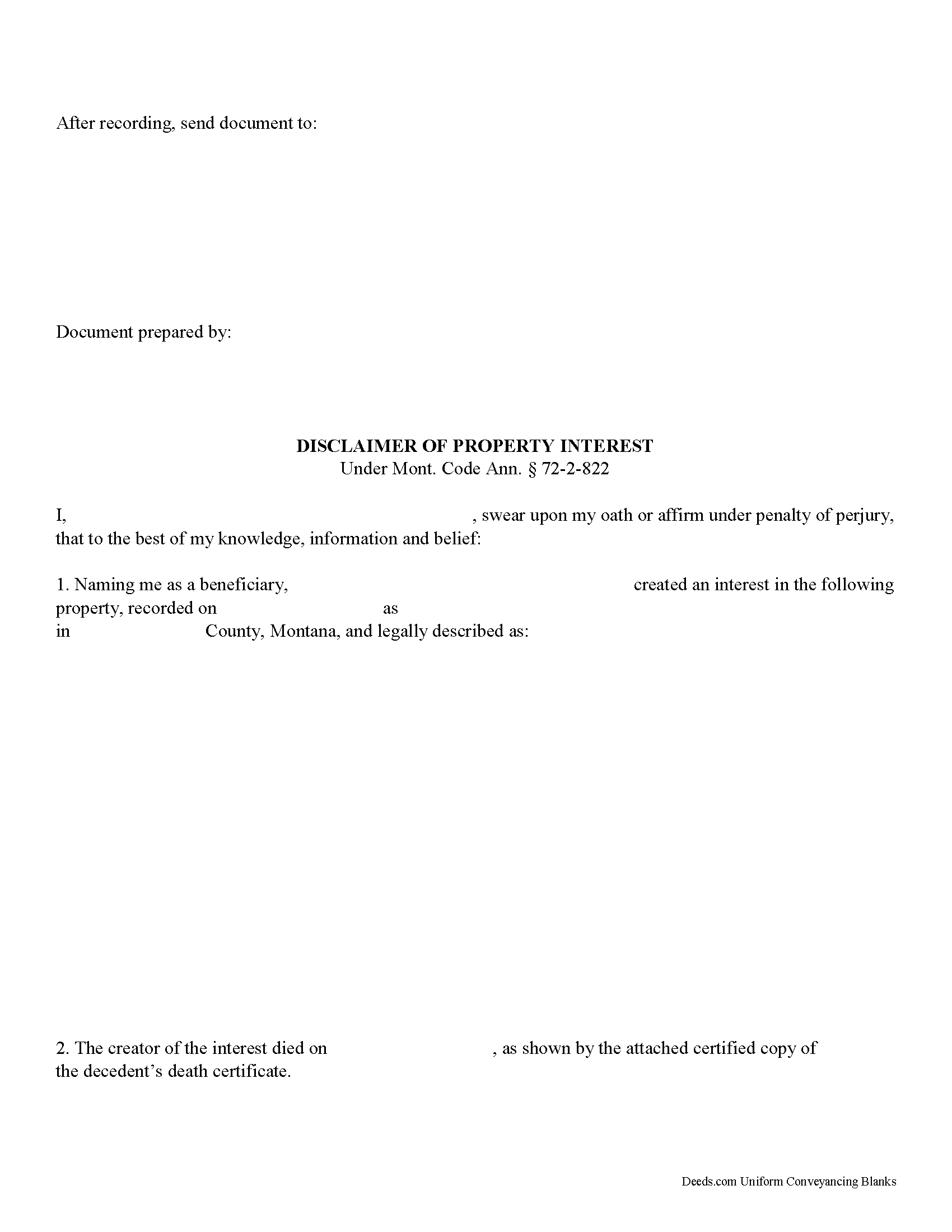
Montana Disclaimer of Property Interest
Under the Montana Code, the beneficiary of an interest in property may disclaim the gift, either in part or in full (Mont. Code Ann. 72-2-822). Note that the option to disclaim is only available to beneficiaries who have not acted in any way to indicate acceptance or ownership of the interest (72-2-822).
TITLE 72. ESTATES, TRUSTS, AND FIDUCIARY RELATIONSHIPS
CHAPTER 2. UPC -- INTESTACY, WILLS, AND DONATIVE TRANSFERS
Part 8. General Provisions Concerning Probate and Nonprobate Transfers
Disclaimer Of Interest In Property
72-2-822.Disclaimer of interest in property. (1) In this section:
(a)"Future interest" means an interest that takes effect in possession or enjoyment, if at all, later than the time of its creation.
(b)"Time of distribution" means the time when a disclaimed interest would have taken effect in possession or enjoyment.
(2)Except for a disclaimer governed by 72-2-823 or 72-2-824, the following rules apply to a disclaimer of an interest in property:
(a)The disclaimer takes effect as of the time the instrument creating the interest becomes irrevocable, or, if the interest arose under the law of intestate s... More Information about the Montana Disclaimer of Interest